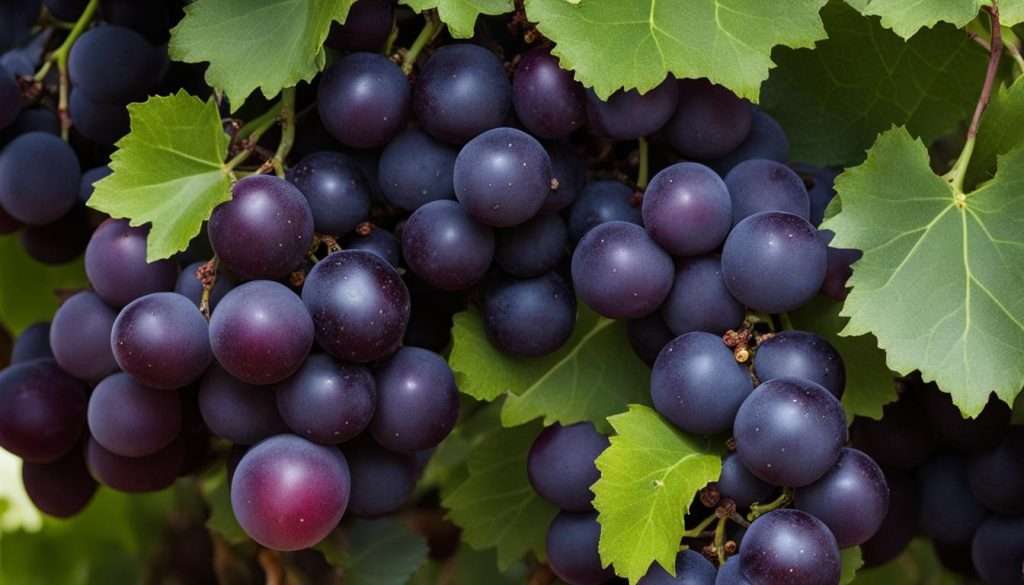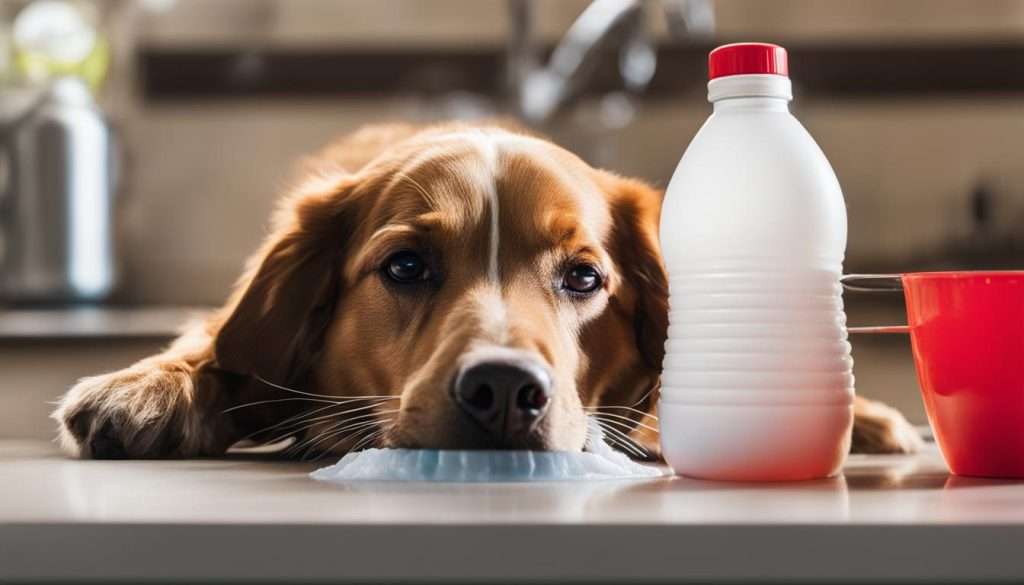As a responsible dog owner, it’s essential to be aware of the foods that can be toxic to your furry friend. Certain human foods can have harmful effects on dogs, ranging from gastrointestinal upset to organ damage and even death. To keep your canine companion safe and healthy, it’s crucial to avoid feeding them these toxic foods.
In this article, we will discuss some of the most common toxic foods for dogs and why they should be avoided. From chocolate and coffee to onions and garlic, we’ll provide you with valuable information to ensure you make informed decisions about your dog’s diet.
Key Takeaways:
- There are several toxic foods that can be harmful to dogs, including chocolate, coffee, onions, and garlic.
- Some plants, such as avocado and citrus, can also be toxic to dogs if ingested.
- Certain nuts, dairy products, and alcohol should be kept away from dogs, as they can cause various health issues.
- It’s important to be mindful of what you feed your dog and seek veterinary guidance if you suspect they have consumed a toxic food.
- By being proactive and educated about poisonous foods, you can safeguard your furry friend’s well-being.
Alcohol and Avocado
When it comes to toxic foods for dogs, it’s essential to be aware of two particularly dangerous elements: alcohol and avocado.
Alcohol: Dogs should never consume alcoholic beverages or foods containing alcohol. Even small amounts of alcohol can have severe consequences for your furry friend. Ingesting alcohol can lead to vomiting, diarrhea, central nervous system depression, and in extreme cases, coma. It’s crucial to keep all alcoholic substances out of your dog’s reach to ensure their safety.
Avocado: While avocados are a popular and nutritious fruit for humans, they can be toxic to certain animals, including birds, rabbits, donkeys, horses, and ruminants. Avocado contains a substance called persin, which can cause cardiovascular damage and even death in these species. For horses, donkeys, and ruminants, ingestion of avocado may result in swollen head and neck. It’s important to keep avocados and any food products containing avocado away from these animals to prevent harm.
| Foods | Toxicity to Dogs |
|---|---|
| Alcohol | Severe consequences, including vomiting, diarrhea, central nervous system depression, and coma. |
| Avocado | Can cause cardiovascular damage and death in birds, rabbits, donkeys, horses, and ruminants. Horses, donkeys, and ruminants may experience swollen head and neck. |
Chocolate, Coffee, and Caffeine
When it comes to our furry friends, chocolate, coffee, and caffeine are definitely off the menu. These seemingly harmless treats can actually be extremely dangerous for dogs due to the presence of a stimulating compound called methylxanthines. Ingesting these substances can lead to a range of health issues and potentially even prove fatal for your beloved pet.
One of the most common symptoms of chocolate, coffee, or caffeine ingestion in dogs is vomiting. This is the body’s natural response to eliminate the harmful substances from the system. Additionally, dogs may also experience diarrhea, increased thirst and urination, and hyperactivity, all of which are clear signs of consumption.
It’s crucial to remember that darker chocolate poses a higher risk for dogs compared to milk chocolate. Baking chocolate, due to its concentrated form, contains the highest levels of methylxanthines, making it incredibly hazardous for your furry friend.
Another disturbing effect of ingesting these substances is the potential to cause abnormal heart rhythm in dogs. This condition, known as cardiac arrhythmia, can lead to more severe health issues if not addressed promptly.
Dogs that have consumed chocolate, coffee, or other caffeine-containing foods may also exhibit tremors and seizures, which are clear indicators of toxicity. These neurological symptoms require immediate veterinary attention to prevent further complications.
Considering the wide range of health risks associated with chocolate, coffee, and caffeine, it is crucial for dog owners to take precautions and ensure that their pets do not have access to these dangerous substances. Keep all food items containing chocolate and caffeine well out of reach and dispose of them properly to protect your furry friend’s well-being.
| Type of Chocolate | Methylxanthines Content (per ounce) |
|---|---|
| Milk Chocolate | 1-15 mg |
| Semi-Sweet Chocolate | 30-150 mg |
| Baking Chocolate | 450-750 mg |
Table: Methylxanthines Content in Different Types of Chocolate.
As shown in the table above, the content of methylxanthines in different types of chocolate can vary widely. It is important to be cautious and avoid any kind of chocolate consumption in dogs to protect them from the potential health risks associated with methylxanthine poisoning.

Dogs bring joy to our lives, and it’s essential that we prioritize their health and safety. By understanding the dangers of chocolate, coffee, and caffeine, we can help our furry friends lead long, happy, and toxin-free lives.
Citrus and Coconut
Citrus fruits, such as oranges, lemons, and grapefruits, have a naturally refreshing taste that appeals to many people. While these fruits can be a healthy snack for humans, it’s important to exercise caution when it comes to feeding them to your dog. Citrus fruits contain citric acid and essential oils that, in large quantities, can cause irritation and potential central nervous system depression in dogs.
It’s worth noting that small doses of citrus, such as eating the fruit itself, are unlikely to cause significant problems for your furry friend. However, it’s always best to consult with your veterinarian before introducing any new foods into your dog’s diet.
“Citrus fruits contain citric acid and essential oils that can cause irritation and potential central nervous system depression if ingested in large quantities.”
Coconut and coconut-based products have gained popularity in recent years due to their unique flavor and potential health benefits. However, it’s essential to be aware that coconut can cause stomach upset, loose stools, or even diarrhea in dogs. This is primarily due to the high oil content present in coconuts.
If you’re considering giving your dog coconut or coconut-based products, it’s important to introduce them gradually and in moderation. This will allow you to monitor your dog’s reaction and determine if they tolerate coconut well. If you notice any signs of stomach upset or digestive issues, it’s best to discontinue feeding coconut to your dog.
Benefits and Risks of Citrus and Coconut for Dogs
| Benefits | Risks |
|---|---|
|
|
In conclusion, while citrus fruits and coconut can offer potential benefits for humans, they should be approached with caution when it comes to feeding them to your dog. Always remember to introduce new foods gradually, monitor your dog’s reaction, and consult with your veterinarian if you have any concerns. By understanding the potential risks and benefits of these fruits, you can make informed decisions to keep your furry friend happy and healthy.
Grapes, Raisins, and Macadamia Nuts
Dogs have a sensitive digestive system, and certain foods can be toxic to them. It is crucial to be aware of the harmful effects of grapes, raisins, and macadamia nuts on dogs’ health. These seemingly harmless snacks can have severe consequences, including kidney failure, weakness, depression, vomiting, tremors, and hyperthermia.

Grapes and Raisins:
Grapes and raisins, although tasty for humans, should never be fed to dogs. Even small amounts of grapes or raisins can lead to kidney failure in dogs, making it essential to keep them away from these fruits. Symptoms may include lethargy, loss of appetite, decreased urinary output, abdominal pain, and dehydration. If you suspect your dog has ingested grapes or raisins, seek immediate veterinary care.
| Symptoms of Grape or Raisin Toxicity: | Treatment |
|---|---|
| – Vomiting | – Induce vomiting if ingestion just occurred. – Administer activated charcoal to prevent absorption. – Intravenous fluids to maintain hydration and flush out toxins. |
| – Diarrhea | |
| – Lethargy | |
| – Abdominal Pain | |
| – Decreased Urinary Output |
Macadamia Nuts:
Macadamia nuts can be harmful to dogs when ingested. These nuts contain an unknown toxin that affects dogs, leading to symptoms such as weakness, depression, vomiting, tremors, and hyperthermia. The onset of symptoms can occur within 12 hours of ingestion and may last up to 48 hours. If you suspect your dog has consumed macadamia nuts, contact your veterinarian immediately.
“It’s important to remember that what may be safe and healthy for us can be toxic to our furry friends. Always be cautious and keep potentially harmful foods out of your dog’s reach.”
As responsible pet owners, it is crucial to keep our dogs safe from toxic foods. By being aware of the dangers of grapes, raisins, and macadamia nuts, we can ensure our furry companions enjoy a healthy and happy life.
Milk, Dairy, and Nuts
Dogs have limited lactase enzyme, making them unable to digest milk and other dairy-based products properly. Feeding dogs milk and dairy can result in diarrhea and gastrointestinal upset. It’s important to avoid giving your dog these products to prevent discomfort and potential health issues.
In addition to milk and dairy, certain nuts can also be harmful to dogs. Almonds, pecans, and walnuts contain high amounts of oils and fats that can cause digestive problems. If ingested, these nuts can lead to vomiting, diarrhea, and even pancreatitis in dogs. It’s best to keep all nuts out of your dog’s reach to ensure their well-being.
“Dogs with lactase deficiency may experience gastrointestinal disturbances if they consume milk or other dairy products.”
Table: Comparison of Milk, Dairy, and Nut Effects on Dogs
| Food | Effect on Dogs |
|---|---|
| Milk and Dairy | Lactase deficiency can cause vomiting, diarrhea, and gastrointestinal irritation. |
| Nuts (Almonds, pecans, walnuts) | High oil and fat content can lead to vomiting, diarrhea, and potential pancreatitis. |
Onions, Garlic, and Raw Meat
If you think about what you put in your dog’s food bowl, you might not realize that some of the ingredients you regularly use in your own cooking can be harmful to them. Onions, garlic, and chives, for example, can cause gastrointestinal irritation in dogs. While a small amount may not cause any noticeable issues, consuming these ingredients in large amounts can lead to red blood cell damage and even anemia in dogs.
Another important food safety concern is raw meat. While it may seem natural for dogs to eat raw meat, it can pose serious risks to both pets and humans. Raw meat and eggs can harbor harmful bacteria, such as Salmonella and E. coli. So, feeding your dog raw meat exposes them to the risk of bacterial contamination. It’s essential to cook meat thoroughly to eliminate these potential health hazards.
Additionally, it’s important to note that feeding dogs raw bones can be dangerous. Raw bones can splinter, causing choking or injury to the digestive tract. Always opt for safe alternatives like specially designed chew toys instead.
Keep in mind that proper nutrition is key to your furry friend’s overall well-being. If you have any concerns about your dog’s diet or suspect they may have ingested harmful foods, consult your veterinarian for guidance and assistance.
Salt and Xylitol
When it comes to your dog’s health, it’s essential to be mindful of the foods they consume. Two substances that can have harmful effects on your furry friend are salt and xylitol.
Excessive salt intake can lead to various health issues in dogs, including excessive thirst, sodium ion poisoning, and, in severe cases, seizures and even death. Therefore, it’s crucial to avoid feeding your dog salt-heavy snacks like potato chips, pretzels, and salted popcorn. These delicious treats may be tempting, but they can put your dog’s well-being at risk.

On the other hand, xylitol, an artificial sweetener found in many household products, can be extremely dangerous for dogs. When ingested, xylitol can cause a sudden release of insulin in dogs, leading to a condition called hypoglycemia, which is characterized by low blood sugar levels. This can result in symptoms such as weakness, confusion, seizures, and even liver failure. Therefore, it’s crucial to keep products containing xylitol, such as chewing gum, candies, and certain baked goods, well out of your dog’s reach.
Here’s a summary of the risks associated with salt and xylitol:
| Salt | Xylitol |
|---|---|
| Excessive thirst | Hypoglycemia |
| Sodium ion poisoning | Liver failure |
| Seizures | Weakness |
Preventing Salt and Xylitol Poisoning
To protect your dog from the dangers of salt and xylitol, it’s important to:
- Avoid feeding your dog salt-heavy snacks
- Check ingredient labels for xylitol and keep products containing it out of your dog’s reach
- Seek immediate veterinary care if you suspect your dog has ingested a large amount of salt or xylitol
By being aware of these potential risks and taking the necessary precautions, you can help keep your furry companion safe and healthy.
Yeast Dough and Conclusion
Feeding dogs yeast dough can be extremely hazardous to their health. When ingested, the yeast in raw dough can continue to rise and produce gas in their stomachs. This gas accumulation can lead to bloating and stomach twisting, a condition known as gastric dilatation-volvulus (GDV), which is a severe and life-threatening emergency. GDV can cause a range of symptoms, including restlessness, pale gums, rapid heartbeat, distended abdomen, and difficulty breathing. Immediate medical attention is vital in such cases to prevent organ damage and save your dog’s life.
Furthermore, the yeast in raw dough can ferment and produce ethanol, causing alcohol intoxication in dogs. Ethanol affects their central nervous system, leading to disorientation, lack of coordination, vomiting, diarrhea, and even coma. It is essential to keep yeast dough and any other alcohol-containing foods or beverages out of your dog’s reach to prevent accidental ingestion.
In conclusion, it is crucial for dog owners to be aware of the harmful effects of certain foods, including yeast dough, and take proactive steps to prevent their pets from accessing these toxic substances. Always store ingredients properly, ensure your countertops are clear of any dough, and never leave unattended dough to rise within your dog’s reach. By prioritizing your dog’s safety and well-being, you can promote a healthy and happy life for your beloved furry friend.
Conclusion
Protecting your dog from consuming poisonous foods is crucial for their overall health and well-being. By being aware of the dangers associated with certain foods and ingredients, you can take proactive measures to ensure the safety of your furry friend. Avoiding toxic foods for dogs is the first step towards maintaining their optimal health.
If you suspect that your dog has ingested a toxic food, it is essential to contact your veterinarian or the nearest animal poison control center immediately. Prompt action can make a significant difference in your dog’s well-being and increase the chances of a positive outcome.
Remember, prevention is key. It is important to familiarize yourself with the list of harmful foods for dogs and create a safe environment for your pet. By doing so, you can avoid unnecessary health complications and provide your dog with a happy and healthy life.
FAQ
What foods should I avoid feeding my dog?
It is important to avoid feeding your dog the following foods:
Alcohol Avocado (especially for birds, rabbits, donkeys, horses, and ruminants) Chocolate, coffee, and foods containing caffeine Citrus fruits (including their stems, leaves, peels, fruit, and seeds) Coconut and coconut-based products Grapes and raisins Macadamia nuts Milk and dairy-based products Nuts (such as almonds, pecans, and walnuts) Onions, garlic, and chives Raw meat and eggs Salt-heavy snacks Xylitol (an artificial sweetener) Yeast doughWhy are these foods harmful to dogs?
These foods can cause various health issues in dogs, ranging from gastrointestinal upset to organ damage and even death. They can lead to symptoms such as vomiting, diarrhea, central nervous system depression, cardiovascular damage, increased thirst and urination, abnormal heart rhythm, tremors, seizures, kidney failure, weakness, depression, gastrointestinal irritation, anemia, bacterial contamination, excessive thirst, sodium ion poisoning, insulin release, gas accumulation, bloating, and potential life-threatening emergencies.
What should I do if my dog has ingested any of these foods?
If your dog has consumed any of these poisonous foods, it is crucial to contact your veterinarian or the nearest animal poison control center immediately. They will provide guidance and potentially recommend treatment based on your dog’s specific situation.
Can small amounts of these foods cause harm to dogs?
While large quantities of these foods are more likely to cause significant problems, even small amounts can lead to adverse effects, especially if consumed regularly or in certain breeds that are more sensitive to certain substances.
Are there any other toxic foods or substances that I should be aware of?
Yes, there are other toxic foods and substances that can be harmful to dogs. It’s important to research and be aware of potential hazards, including toxic plants, medications, chemicals, and other household items that can pose a risk to your pet’s health.
How can I prevent my dog from accessing these toxic foods?
To prevent your dog from consuming these poisonous foods, it’s important to store them securely and out of your dog’s reach. Be mindful of where you place food items, avoid feeding your dog from your plate or allowing them access to unattended food, and educate yourself and your family members about the dangers of toxic foods for dogs.